73 Powerful Coaching Questions to Ask Your Clients
 A powerful coaching question ignites the imagination of your client and helps them to overcome boundaries.
A powerful coaching question ignites the imagination of your client and helps them to overcome boundaries.
Let me ask you these four questions right away:
- How long have you been coaching?
- When you started your career, how did you define a powerful question?
- How has that changed?
- What did you do to become better at asking questions?
The last three questions are good examples of “powerful questions,” while the first is obviously not.
Throughout this article, you will discover how to frame your own powerful questions, with proven examples and links to invaluable resources for any coach. By the end, you’ll have heaps more insight into the art of asking questions as well as a few ideas you can introduce immediately for richer, more productive coaching sessions.
Before you read on, we thought you might like to download our three Positive Psychology Exercises for free. These science-based exercises explore fundamental aspects of positive psychology, including strengths, values, and self-compassion, and will give you the tools to enhance the wellbeing of your clients, students, or employees.
This Article Contains:
- What Makes a Good Coaching Question?
- Best Life Coaching Questions to Ask
- For Leaders and Managers
- For Careers and Business
- Coaching Questions for Developing Confidence
- For Reflection and Discovery
- 13 Questions for Goal Setting
- Great Coaching Questions for Decision Making
- For Couples and Relationships
- Questions to Ask for Building Resilience
- 6 Best Books on the Topic
- A Take-Home Message
- References
What Makes a Good Coaching Question?
A powerful question accomplishes several vital things and is surprisingly easy to recognize, regardless of one’s country of origin (Vogt, Brown, & Isaacs, 2003). For instance, Vogt et al. (2003) asked people from a variety of cultures to score the following questions on a scale of 1–10, with 10 being the most powerful.
- What time is it?
- Did you take a shower?
- What possibilities exist that we haven’t thought of yet?
- What does it mean to be ethical?
Almost everyone ranked the first two questions as less powerful, and the last two as more powerful. Vogt et al. (2003) assert that “powerful questions are ones that transcend many boundaries.” Good coaching questions are able to do the following:
- Generate curiosity in the listener
- Stimulate reflective conversation
- Provoke thought
- Surface underlying assumptions
- Invite creativity and new possibilities
- Generate energy and forward movement
- Channel attention and focus inquiry
- Stay with participants
- Touch a deep meaning
- Evoke more questions
- Travel well
A question, whether it is in a coaching, teaching, or interviewing context, is stronger when it encourages the person to reflect and elaborate.
For example, asking, “Do you like working as a coach?” has the potential to stop the conversation before it gets started. This is a closed-ended question.
A better way to ask this question is, “What about working as a coach is satisfying to you?” This is an open-ended question. Notice that it begins with one of the five Ws often utilized by journalists. The other Ws are who, where, when, and why. Journalists also use how, how long, and how much. You do not necessarily want or need to use all of these.
Asking closed-ended questions is one of 10 mistakes author and coach Tony Stoltzfus (2008) recommends coaches avoid.
In addition, he suggests the following:
- Stay clear of solution-oriented questions. These are closed-ended questions disguised as advice.
- Avoid trying to find that one question that you believe will cause a cascade of revelation for the client. Let the process unfold naturally.
- Do not ramble. Think about what you want to ask. Let silence work its magic while you are thinking. Sometimes the client will continue talking, and your question will not be needed. If it still is, then ask one question. Allow the client time to reflect and respond. Basically, get comfortable with a little silence.
- Avoid interpreting what the client is saying. Use their words to formulate your question. For example, if a client says, “I’m frustrated with my family. I’m constantly cleaning up after everyone else, and I don’t have time to do what I want.” You might respond with, “How long have you been frustrated?” or “What are some things that you want to do?“
- Do not ask rhetorical questions. These are simply statements filled with judgment and preachiness, ending with a question mark. For instance, “What were you thinking?” Of course, the tone of voice you use and your body language can make or break this type of question.
- Do not lead the witness. Guiding the client to answer in a specific way does nothing to help them figure things out.
- Interrupt the client. Sometimes the client will ramble and lose focus. Find a way to bring them back to the question at hand.
- Interrupting too much also is troublesome. This includes talking over and talking for the client. Count to two before responding or asking a question.
- ‘Why’ questions can make a client defensive and feel as though they are being judged.
Throughout this article, many of the questions cited have been borrowed from Stoltzfus’s (2008) book.
From a coaching perspective, the client is the expert about who they are. Asking questions that encourage them to reflect on their answers is respectful of the peer-to-peer relationship between the coach and client. This is what good coaching questions accomplish.
Vogt et al. (2003) describe the above as the structure of powerful questions. The structure is not the only consideration. A coach also must understand the scope of the questions asked, as well as the guiding assumptions.
When determining scope, ask questions that help the person reflect on themselves first. For example, “How can you best use your strengths every day in your current position?” Then, broaden the scope to include a larger portion of their organization by asking, “How can you best use your strengths within your team?”
If appropriate, the coach could go further and expand this to the larger organization. The client’s ability to take action is a critical part of defining the scope of a question.
The assumptions underlying a question can be negative or positive. Negative assumptions often lead to defensive responses, while positive ones encourage reflection, learning, exploration, and growth. One way to identify assumptions is to ask, “What assumptions or beliefs am I holding onto about this situation?”
A coach could also encourage the client to view things from an entirely different perspective. For instance, when a client is hard on themselves, a coach might ask, “If your best friend was self-critical about a mistake they made, what might you say to them to help them feel better?”
At the beginning of your coaching career, asking powerful questions requires some forethought, but after you become more skilled as a coach, the questions flow more naturally. The most powerful questions to ask are not the ones a coach asks a client, at least not in the beginning.
Vogt et al. (2003) offer great insight into how coaches can better frame questions. These are questions to ask yourself as you develop questions for clients.
- Is this question relevant to the real life and real work of the person who will be exploring it?
- Is this a genuine question – a question to which I/we don’t know the answer?
- What “work” do I want this question to do? That is, what kind of conversation, meanings, and feelings do I imagine this question will provoke in those who will be exploring it?
- Is this question likely to invite fresh thinking/feeling? Is it familiar enough to be recognizable and relevant, and different enough to call forward a new response?
- What assumptions or beliefs are embedded in the way this question is constructed?
- Is this question likely to generate hope, imagination, engagement, creative action, and new possibilities? Or is it possible to increase a focus on past problems and obstacles?
- Does this question leave room for new and different questions to be raised as the initial question is explored?
See also: Classic Therapy Questions Therapists Tend to Ask.
Best Life Coaching Questions to Ask

On the one hand, it is about assisting a client in figuring out their life purpose and is future oriented.
On the other, it is about helping them refocus what is happening in their life right now. The objective, as Stoltzfus says (2008, p. 49), is to create a “better future and a better life today.” He defines life purpose as:
“The energy of passion, channeled through my experience and design in the service of a greater calling. Pursuing one’s life purpose generates lasting fulfillment and significance.”
Here, “design” means a person’s talents, personality type, traits, etc. We know, without the need for quantifiable research, that when our work aligns with our talents, skills, and abilities, we feel a greater sense of satisfaction, fulfillment, and achievement. Work does not feel like “work.”
There are several questions that coaches can ask clients to assist them on their path toward purpose. Here are 10 to get you started.
- What do you already know about what you were made to do?
- When you were a kid, what did you want to be when you grew up? What roles attracted you?
- What roles or responsibilities do you enjoy and feel good at? What sucks you dry?
- Name three specific things that would definitely be part of your ideal job or role, and three things that definitely wouldn’t.
- What has your life experience told you about your destiny?
- What relationships or people have influenced your sense of destiny? How?
- How would a good friend describe what you are like? Which of your traits seem to stand out to others?
- What are you great at? What are your best talents or natural abilities?
- What do you feel has been revealed to you about your destiny or calling?
- What sense of purpose have you drawn from your culture or community?
For more great questions, check out our post on 100 powerful Life Coaching Questions for dedicated life coaches.
For Leaders and Managers
There is a truism in the world of martial arts that also applies to leadership. It is not until you reach the pinnacle that you realize and understand how much you do not know and still need to learn. It is through teaching others that actual growth and development of wisdom happens for leaders and managers. Coaches help leaders and managers develop themselves as coaches.
Michael Bungay Stanier (2016) advises coaching in 10 minutes or less. He’s the founder of Box of Crayons and the author of several books, including The Coaching Habit: Say Less, Ask More & Change the Way You Lead Forever. His approach focuses on seven questions leaders can use to help their teams. They are:
- The kickstart question: What’s on your mind?
- The awe question: And what else?
- The focus question: What’s the real challenge here for you?
- The foundation question: What do you want?
- The lazy question: How can I help?
- The strategic question: If you’re saying “yes” to this, to what are you saying “no?”
- The learning question: What was most useful for you?
Each chapter concludes with how the client can implement the new habit. For example, if the client has a habit of jumping in and not allowing team members time to process and respond, then the new habit is, “I will wait five seconds after my team member finishes speaking before responding.”
The coach’s role is to assist the leader in utilizing their talents better so that they can ask powerful questions of their team members. Sometimes this might require a mindset shift when the leader is frustrated with a team member or lacks the patience needed to coach for behavior change.
In these cases, a corporate wellness coach can employ questions for the leader that will help them manage their emotions related to the situation. Role-play is a good technique for practicing this.
For Careers and Business

This is when a coach can ask just the right questions to help the person discover the answers they need.
Often, the coachee knows the answer but needs someone to reflect or affirm that they are moving in the direction they desire.
Here are 13 questions a coach can ask to do this:
- What are you passionate about?
- How do you want to contribute?
- What do you want to learn?
- How much does the organization need you?
- How much do you need the organization?
- What was your original vision when you started your career? How has it changed?
- What aspects of your current job directly relate to your vision?
- What would you like to be doing in five years?
- What part of that could you do now?
- How do you plan and prepare so that you can be in that role in five years?
- What would you say are your best strengths?
- How are you using them in your current role?
- How could you increase how much you are using your strengths?
Like all of the lists you will read throughout this article, this is not exhaustive. These are a jumping-off point.
Coaching Questions for Developing Confidence
Using appreciative inquiry (AI) as a starting point helps clients gain confidence in their ability to make immediate, lasting changes. Appreciative inquiry questions highlight “the true, the good, and the possible” (McQuaid, 2015).
The focus is on operating from a positive rather than a negative mindset. AI involves four elements, called the 4-D cycle, initially developed by David Cooperrider and Suresh Srivastava (n.d.). They are:
Discovery – When you’re engaged, energized, and enjoying life, what are you doing?
Dream – If you could do what you do best more consistently, what might be possible?
Design – How can you move from where you are to where you want to be?
Destiny – If there were one action you could take, where would you be willing to start?
Coach Jackie Kelm explains how AI works.
Frequently applied to organizations seeking change, these same ideas work with individuals. Dr. Lynn Jones (n.d.) developed a series of questions coaches can use with clients. For example, when working with someone who has an entrepreneurial spirit, you might ask:
- What could you imagine doing if you knew you couldn’t fail?
- What will it mean to you when you are successful?
- What would success look like?
- What would success feel like?
- What is the upside to successful effort?
- What have you accomplished already?
Each of these questions requires the person to reflect, discover, and then dream about their future in a positive way. AI questions ask what the person wants more of, and how one small step gets them closer to achieving their goal. For more on this, check out Robert Maurer’s (2014) book, One Small Step Can Change Your Life: The Kaizen Way.
Small gains build confidence and increase our internal motivation to continue.
For Reflection and Discovery

The objective is to help the client identify what is essential for them at this point in their life.
In his book, Essentialism: The Disciplined Pursuit of Less, author Greg McKeown (2014) advocates doing less, but better. Rather than allowing outside forces to pull us in many directions, these questions help to hone in on what is essential.
- What’s taking shape? What are you hearing underneath the variety of opinions being expressed? What’s in the center of the table?
- What’s emerging here for you? What new connections are you making?
- What had real meaning for you from what you’ve heard? What surprised you? What challenged you?
- What’s missing from this picture so far? What is it we’re not seeing? What do we need more clarity about?
- What’s been your major learning, insight, or discovery so far?
- What’s the next level of thinking we need to do?
- If there was one thing that hasn’t yet been said to reach a deeper level of understanding/clarity, what would it be?
13 Questions for Goal Setting
Setting attainable goals is not as simple as it might seem at first. Often people create lofty goals that either really belong to someone else or are not broken down into manageable enough segments.
Achieving any goal is about a few key things. First is desire. Second, the client needs to break down the goal into its parts. Third, the client needs to create a plan.
A coach can help a client with these last two, but a coach cannot instill desire. Desire is about drive and internal motivation. Making a step-by-step plan and achieving small successes can increase the desire to continue (Center for Self-Determination Theory, n.d.).
Here are some questions a coach might ask, borrowed from the South African College of Applied Psychology (SACAP, 2019).
- What is most important to you in life?
- What are you most proud of in life?
- When was the last time you woke up feeling optimistic or excited about the day ahead?
- Where would you be if all obstacles in your way ceased to exist?
- Where would you be if you had unlimited resources?
- Where do you fear ending up if nothing changes?
- Is there anything you believe in so strongly that you would be willing to sacrifice for it?
When goal setting, it is important to identify any potential obstacles. Doing so allows the client the opportunity to create “if–then” responses to them as necessary. For example, if a client has an exercise goal, but travels several times per week for work, it could be difficult to work out consistently.
One “if–then” statement could be, “If I’m stuck in an airport, then I’ll walk to and from the bathroom farthest from my gate, but still in my terminal, for 10 minutes without stopping to look at anything. I will do this once per hour until it’s time to board the plane.”
SACAP also suggests asking the following questions to assist the client with obstacles.
- Are there any steps you could take right away that would significantly improve your situation?
- Which of your goals require assistance from other people, and which ones depend entirely on you?
- What obstacles have you faced in the past, and how did you overcome them?
- What mistakes have you made in the past, and what did you learn from them?
- What is the biggest issue on your mind today/this week?
- What are the biggest issues you face daily?
Assisting clients to identify and clarify attainable goals is one of the primary roles of any coach.
Great Coaching Questions for Decision Making
Sometimes clients find it difficult to make decisions. When this happens, the right questions from the coach can make a big difference. Stoltzfus (2008) recommends the following:
- How will you make the decision?
- What factors will make the most difference to you?
- What do you need to know to make a great decision?
- What would a great decision look like?
- How do you usually make decisions?
- What other decision strategies could you use? Which methods do you want to try?
He also includes 13 decision-making strategies because some clients do not know or recognize the strategy they are using. They even might not realize others exist.
A few examples are:
- Principled: “How do the key principles and priorities you live by apply here?”
- Counsel: “What does your partner think? How about some key friends or advisors?”
- Rationale: “What are the pros/cons of pursuing each option? Which is most advantageous?”
- Spiritual: “What decision would best align with your faith? What is God saying to you on this?”
- Negative drives: “What fears or inner drives are influencing your response? How could you remove those things from the equation so you can make a better decision?”
- Cost: “What would it cost in terms of time and resources to do this? What would it cost if you don’t do this? What’s the cost if you don’t decide or let circumstances overtake you?”
For Couples and Relationships

Coaching is present and future focused, so questions typically follow this route.
The coach is not concerned with who or what the coachee feels is “to blame” for their current situation. The purpose is a more goal-oriented exploration of how to move from perceived problems to solutions identified by the couple or individual (Wingert, 2016).
With this in mind, here are several interesting questions you can use with your client.
- How did you decide to pursue couples’ coaching?
- What are your hopes for how coaching might be helpful for your relationship?
- What do you want to accomplish through this coaching relationship?
- How long do you expect it to take for you to reach your goals?
- What would you like to start happening in your relationship?
- What would you like to stop happening?
- What is going well that you do not want to change?
- If there was one tool that could significantly help your relationship, what would that tool do?
- If a miracle happened tonight while you slept that solved all of your problems, what would be different tomorrow?
It is important to recognize that coaching is not therapy, and the requirements for the two differ. In the United States, therapy is highly regulated, requires extensive training, and licensure. Coaching is, as yet, an unregulated field. Some coaches have extensive backgrounds, while others do not.
Coaching is not the same as or a replacement for therapy. If a couple seeks a coaching relationship, but it is evident that therapy is a better fit, then it is up to the coach to point this out, especially if the coach does not have the appropriate level of training. Some coaches follow the ethical guidelines established by the International Coaching Federation.
Questions to Ask for Building Resilience
Resilience coaching involves helping a client develop their capacity to “remain flexible in thoughts, behaviors, and emotions when under stress” (Pemberton, n.d.). Resilience takes a hit when a person encounters failures, like a career setback.
It also can happen when too many demands overload a person. Pemberton points out that these situations can lead to a person being unable to make decisions, be creative, or manage their emotions. Their self-confidence also decreases. Asking carefully crafted questions can help the client rebound.
A resilience coach will want to know a client’s baseline level of resilience. How does the person typically respond to life’s stressors and setbacks? Pemberton offers a useful 24-question survey. It includes statements that the client can respond to, such as:
- I have the skills and experience to deal with the demands of my life.
- I have the flexibility to adapt to whatever is presented to me.
- I have a clear sense of what is important in my life, which gives me a compass point for the decisions I make.
The client scores each item on a scale from 1 (strongly disagree) to 5 (strongly agree). Once completed and submitted, the client receives an explanation. The areas covered include:
- Self-belief
- Elasticity
- Meaning
- Solution building
- Support
- Proactivity
- Managing emotions
- Realistic positivity
From these results, a coach can begin asking questions to assist the client. For instance, if the client scores particularly high in elasticity, the coach might ask:
- “What factors do you feel contribute to your ability to remain flexible when faced with a setback?”
- “How can you apply that to your current challenge?”
6 Best Books on the Topic
Whether you are just starting your career as a coach or are more experienced, these books have something to offer. For an even wider selection, read our article on 20 life coaching books that you should read.
1. Coaching Questions: A Coach’s Guide to Powerful Asking Skills – Tony Stoltzfus
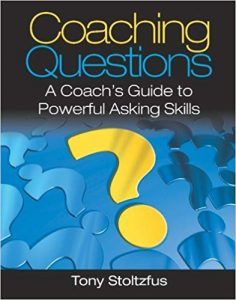
You will learn about the coaching process, including various models like GROW, a coaching funnel, and the Life Wheel.
Available on Amazon.
2. The Coaching Habit: Say Less, Ask More and Change the Way You Lead Forever – Michael Bungay Stanier
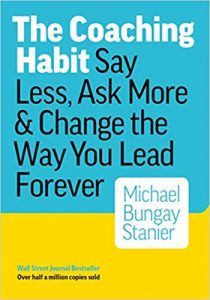
He shares seven essential questions to help you develop this habit.
The first question that gets the ball rolling is, “What’s on your mind?”
Available on Amazon.
3. The Book of Beautiful Questions: The Powerful Questions That Will Help You Decide, Create, Connect, and Lead – Warren Berger
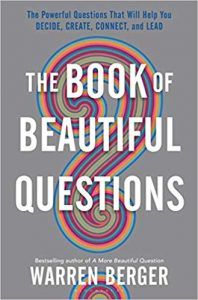
- Better decision making
- Sparking creativity
- Connecting with others
- Developing stronger leadership
- How to lead an inquiring life
Available on Amazon.
4. The HeART of Laser-Focused Coaching: A Revolutionary Approach to Masterful Coaching – Marion Franklin
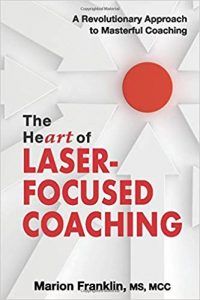
Franklin also shares 25 themes that underlie every coaching situation.
She explains a step-by-step process for creating a shift in perspective that is easy to follow.
Available on Amazon.
5. Ask Powerful Questions: Create Conversations That Matter – Will Wise and Chad Littlefield
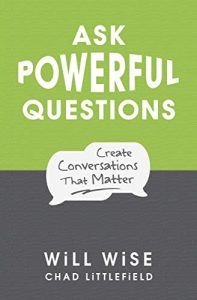
In the last chapter, the book covers co-facilitating, managing over-talkers, debate, dialogue, and silence.
Available on Amazon.
6. Resilience: A Practical Guide for Coaches – Carole Pemberton
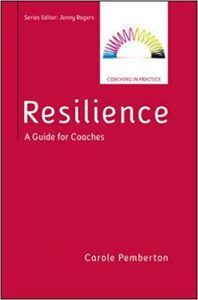
It includes research-based interventions.
Chapters cover several areas including:
- Managing thoughts using Cognitive-Behavioral Therapy
- Acceptance and Commitment Therapy
- Mindfulness
- Solution building
- Positive psychology
- Writing as a recovery tool
- Resilience narrative
- Career coaching for resilience
Available on Amazon.
What books would you suggest? Please share your recommendations in the comment section.
A Take-Home Message
There are many compelling questions that coaches can use during a session. Open-ended questions allow for reflection and establish a peer-to-peer relationship between the coach and the client. Some closed-ended questions can be useful when used sparingly.
Coaching is still an unregulated field. While some coaches have extensive training, others do not. People seeking this type of arrangement can interview the coach before embarking on a coach/coachee relationship. Certification can indicate a certain level of knowledge. Still, it does not necessarily mean that the coach is the right fit or has the necessary experience the client wants or needs.
Every coach can develop their use of powerful questions during a coaching session. Doing so helps the coach create a stronger, more effective relationship with the client.
How are you using powerful questions in your coaching practice? What questions would you suggest other coaches use?
We hope you enjoyed reading this article. Don’t forget to download our three Positive Psychology Exercises for free.
- Berger, W. (2018). The book of beautiful questions: The powerful questions that will help you decide, create, connect, and lead. Bloomsbury.
- Center for Self-determination Theory (n.d.). The theory. Retrieved December 27, 2019, from https://selfdeterminationtheory.org/the-theory/
- Cooperrider, D. (n.d.). What is appreciative inquiry? Retrieved December 26, 2019, from, https://www.davidcooperrider.com/ai-process/
- Franklin, M. (2019). The HeART of laser-focused coaching: A revolutionary approach to masterful coaching. Thomas Noble Books.
- Hart, V., Blattner, J., & Leipsic, S. (2001). Coaching versus therapy: A perspective. Consulting Psychology Journal: Practice and Research, 53(4), 229–237.
- Jones, L. K. (n.d.). 70 great coaching questions from the Houston ICF. Retrieved December 26, 2019, from http://www.lynnkjones.com/categories/appreciative-inquiry-categories/coaching-questions/
- Kelm, J. (2011 October 4). What is appreciative inquiry? [Video]. YouTube. https://youtu.be/ZwGNZ63hj5k
- Maurer, R. (2014). One small step can change your life: The kaizen way. Workman Publishing Company.
- McKeown, G. (2014). Essentialism: The disciplined pursuit of less. Crown Business.
- McQuaid, M. (2015, July 13). Can a simple question change your life? [Video]. YouTube. https://youtu.be/rpld5GZjk0U
- Pemberton, C. (n.d.). Resilience coaching. Retrieved December 27, 2019, from https://carolepemberton.co.uk/resilience-coaching/
- Pemberton, C. (2015). Resilience: A practical guide for coaches. Open University Press.
- South African College of Applied Psychology (2019, March 13). The most powerful questions a coach can ask [Web blog post]. Retrieved December 27, 2019, from https://www.sacap.edu.za/blog/coaching/coaching-questions/
- Stanier, M. B. (2016). The coaching habit: Say less, ask more & change the way you lead forever. Page Two.
- Stoltzfus, T. (2008). Coaching questions: A coach’s guide to powerful asking skills. Coach22 Bookstore.
- Vogt, E. E., Brown, J., & Isaacs, D. (2003). The art of powerful questions: Catalyzing insight, innovation, and action. Whole Systems Associates.
- Wingert, D. (2016, August 23). What’s the difference between a therapist and a life coach? Good Therapy. Retrieved on December 26, 2019, from https://www.goodtherapy.org/blog/whats-difference-between-therapist-life-coach-0823165
- Wise, W., & Littlefield, C. (2017). Ask powerful questions: Create conversations that matter. We!
Let us know your thoughts
Read other articles by their category
- Body & Brain (49)
- Coaching & Application (57)
- Compassion (26)
- Counseling (51)
- Emotional Intelligence (24)
- Gratitude (18)
- Grief & Bereavement (21)
- Happiness & SWB (40)
- Meaning & Values (26)
- Meditation (20)
- Mindfulness (45)
- Motivation & Goals (45)
- Optimism & Mindset (34)
- Positive CBT (28)
- Positive Communication (20)
- Positive Education (47)
- Positive Emotions (32)
- Positive Leadership (18)
- Positive Parenting (4)
- Positive Psychology (33)
- Positive Workplace (37)
- Productivity (16)
- Relationships (46)
- Resilience & Coping (36)
- Self Awareness (21)
- Self Esteem (37)
- Strengths & Virtues (31)
- Stress & Burnout Prevention (34)
- Theory & Books (46)
- Therapy Exercises (37)
- Types of Therapy (64)





What our readers think
Many thanks for this wonderfully accessible and informative article. I would love a printable copy of this. Is that available anywhere?
Hi Tanya,
Thank you so much! At the moment, we do not offer PDF versions of our articles but perhaps you would like to copy and paste the content (including the references) into a document and print it that way 🙂
Kind regards,
-Caroline | Community Manager
Additional Good Reads & PDF Are Quite the Bonus!..Thanks!
Could you please help find the Vogt et al reference?
Hi Hector,
Of course! Here is the reference:
Vogt, E. E., Brown, J., & Isaacs, D. (2003). The art of powerful questions: Catalyzing insight, innovation, and action. Whole Systems Associates.
You can read this article for free here.
Hope this helps!
– Nicole | Community Manager
Your article was well written and very insightful. Thank you for sharing it.
Can you forward me a pdf copy of these questions. Was not able to download.
Thank you!